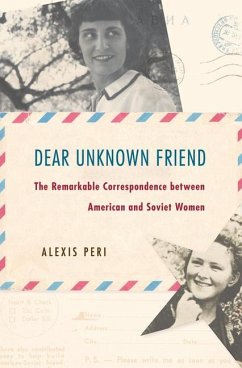In the tense years of the early Cold War, American and Soviet women conducted a remarkable pen-pal correspondence that enabled them to see each other as friends rather than enemies. In a compelling new perspective on the early Cold War, prizewinning historian Alexis Peri explores correspondence between American and Soviet women begun in the last years of World War II and continuing into the 1950s. Previously unexamined, the women's letters movingly demonstrate the power of the personal, as the pen pals engaged in a "diplomacy of the heart" that led them to question why their countries were so divided. Both Soviet and American women faced a patriarchal backlash after World War II that marginalized them professionally and politically. The pen pals discussed common challenges they faced, such as unequal pay and the difficulties of balancing motherhood with a career. Each side evinced curiosity about the other's world, asking questions about family and marriage, work conditions, educational opportunities, and religion. The women advocated peace and cooperation but at times disagreed strongly over social and economic issues, such as racial segregation in the United States and mandatory labor in the Soviet Union. At first both governments saw no risk in the communications, as women were presumed to have little influence and no knowledge of state secrets, but eventually Cold War paranoia set in. Amid the Red Scare, the House Un-American Activities Committee even accused some of the American women of being communist agents. A rare and poignant tale, Dear Unknown Friend offers a glimpse of the Cold War through the perspectives of women who tried to move beyond the label of "enemy" and understand, even befriend, people across increasingly bitter political divides.
Bitte wählen Sie Ihr Anliegen aus.
Rechnungen
Retourenschein anfordern
Bestellstatus
Storno








